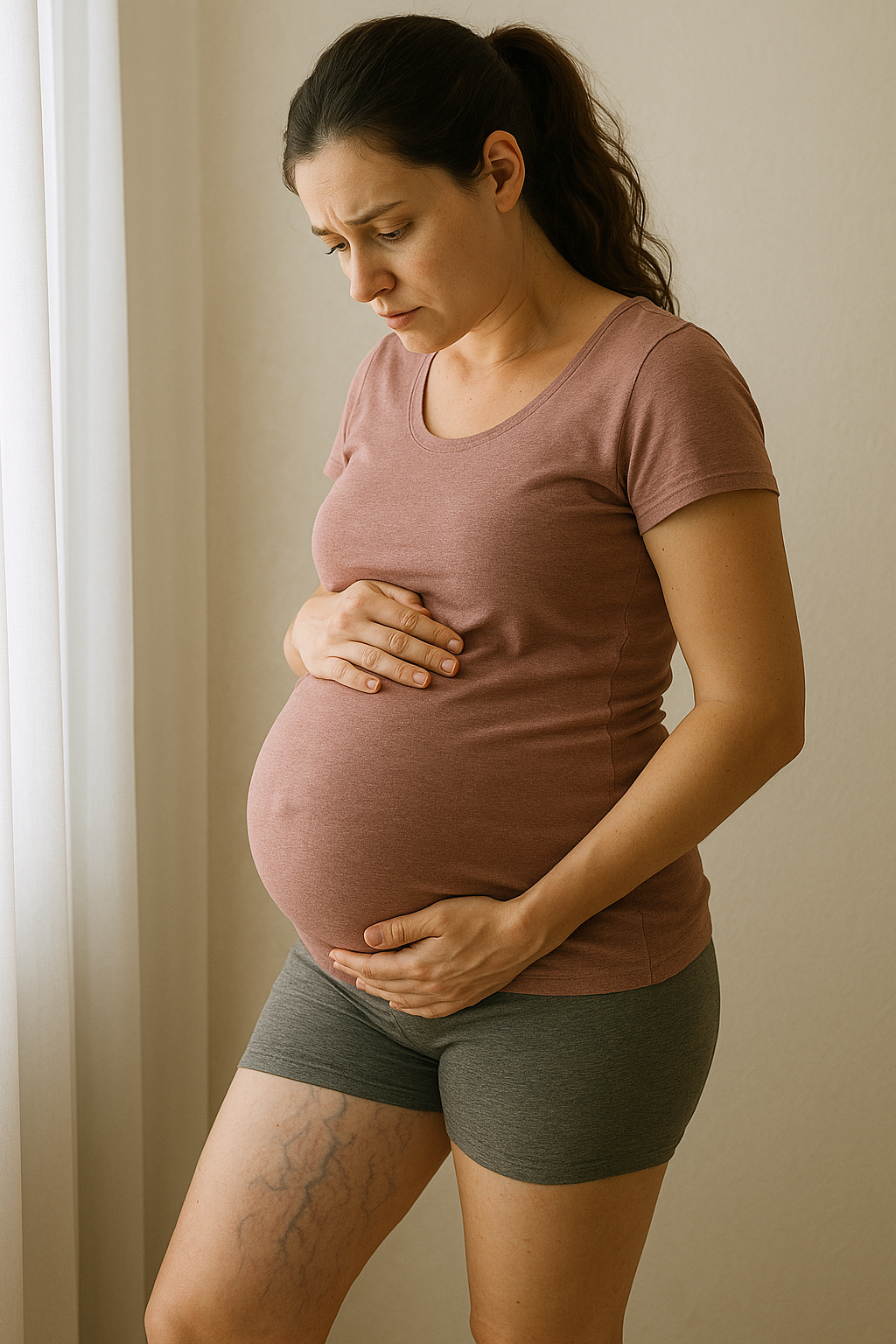What Women Need to Know About Vein Health During Pregnancy

Introduction
Pregnancy is a beautiful, transformative time—but let’s be honest, it’s also demanding on your body. From hormonal shifts to weight changes, your body goes through major adjustments to support your growing baby. And one area that often gets overlooked is vein health.
If you’ve noticed leg swelling, bulging veins, or aching in your calves during pregnancy, you’re not alone. Many women develop varicose veins, spider veins, or general leg discomfort during pregnancy due to the unique stresses placed on the circulatory system.
In this blog, we’ll cover:
- Why pregnancy affects your veins
- Common vein issues during pregnancy
- What you can safely do about them
- When to seek medical evaluation
Let’s help you feel more comfortable, informed, and supported—so you can focus on enjoying this special journey.
Why Pregnancy Affects Vein Health
Pregnancy is one of the most significant risk factors for developing vein problems. Here’s why:
1. Increased Blood Volume
Your body produces about 50% more blood during pregnancy to nourish the baby. This puts added strain on your veins—especially those in the legs—making it harder to push blood back to the heart.
2. Hormonal Changes
The hormone progesterone helps relax blood vessels to support pregnancy—but it also weakens vein walls and valves, increasing the risk of blood pooling in the legs.
3. Pressure from the Uterus
As your baby grows, the uterus puts pressure on the inferior vena cava, a large vein that carries blood from your legs back to your heart. This pressure slows venous return and contributes to varicose veins and swelling.
4. Genetic Predisposition
If you have a family history of varicose veins, you’re more likely to experience them during pregnancy—even if you’ve never had symptoms before.
Common Vein Issues During Pregnancy
Here are some of the most common vein-related symptoms women experience while expecting:
Varicose Veins
These are bulging, twisted veins that often appear on the calves, behind the knees, or in the thighs. They may be blue or purple and can cause:
- Aching
- Throbbing
- Heaviness
- Swelling
They usually appear in the second or third trimester, when blood volume and abdominal pressure peak.
Spider Veins
Tiny red, blue, or purple veins just under the skin, often seen on the thighs, calves, or ankles. They’re usually painless but can be a cosmetic concern and an early sign of venous stress.
Leg Swelling (Edema)
Mild swelling is common in pregnancy, especially in the ankles and feet. However, persistent swelling that worsens by evening may indicate venous insufficiency.
Pelvic Congestion Syndrome (PCS)
Some women develop varicose veins deeper in the pelvis, leading to:
- Pelvic pressure or fullness
- Pain with intercourse
- Aching that worsens when standing
PCS is harder to detect visually and may persist after delivery if left untreated.
Are Vein Problems During Pregnancy Dangerous?
In most cases, vein issues during pregnancy are not dangerous and resolve or improve after delivery. However, they should still be taken seriously for several reasons:
- Chronic venous insufficiency can progress over time
- Veins that appear during pregnancy are more likely to return in future pregnancies
- Blood clots (DVT), while rare, are more likely during pregnancy and postpartum
If you experience sudden leg pain, warmth, redness, or one-sided swelling, seek medical attention immediately to rule out a clot.
Can You Treat Veins During Pregnancy?
While major vein procedures are typically postponed until after childbirth, there are safe and effective ways to manage vein symptoms during pregnancy.
1. Compression Stockings
Wearing graduated compression hose improves circulation, reduces swelling, and eases leg fatigue. Look for medical-grade (15–30 mmHg) stockings and wear them in the morning before standing for long periods.
2. Elevate Your Legs
Whenever possible, rest with your legs above heart level. This helps reduce pooling and supports venous return.
3. Stay Active
Low-impact movement like walking, swimming, and prenatal yoga can enhance blood flow, strengthen the calf muscles (your “second heart”), and relieve pressure on your veins.
4. Avoid Long Periods of Sitting or Standing
Change positions frequently. If your job requires standing or sitting for long stretches, take breaks to stretch, walk, or elevate your legs.
5. Stay Hydrated and Reduce Sodium
Proper hydration and a balanced diet help minimize swelling and fluid retention.
What About After Delivery?
For many women, vein symptoms improve naturally within a few months postpartum as blood volume and hormone levels return to normal.
However, if:
- Your veins remain bulging or painful
- You notice increasing discomfort
- New veins appear with each pregnancy
- You develop skin changes, itching, or heaviness
…it may be time to explore diagnostic imaging (venous ultrasound) and treatment options.
Safe Treatment Options After Pregnancy
Once you’ve delivered and completed breastfeeding, you may consider:
- Endovenous laser therapy (EVLT)
- Sclerotherapy for spider veins
- Ultrasound-guided foam sclerotherapy for deeper reflux
These procedures are:
- Minimally invasive
- Done in-office
- Covered by insurance if medically necessary
- Require little or no downtime
Preventing Vein Issues in Future Pregnancies
If you’ve had varicose veins in a past pregnancy, it’s wise to:
- Begin wearing compression early in your next pregnancy
- Stay active and avoid excessive weight gain
- Consider a preconception vein evaluation to identify any reflux or damage from the previous pregnancy
- Discuss treatment between pregnancies to prevent worsening vein disease later
Final Thoughts
Pregnancy brings incredible changes—and your veins are no exception. While many vein symptoms are temporary and harmless, they can also be the first sign of underlying venous insufficiency. Paying attention to your vein health now can prevent complications and discomfort in future pregnancies and beyond.
At Sheen Vein & Cosmetics, we specialize in supporting women through all stages of life—including pregnancy and postpartum vein care. Whether you need compression guidance, an ultrasound, or a customized post-pregnancy treatment plan, we're here to help.
Schedule a vein consultation today and give your legs the care they deserve—during pregnancy and beyond.